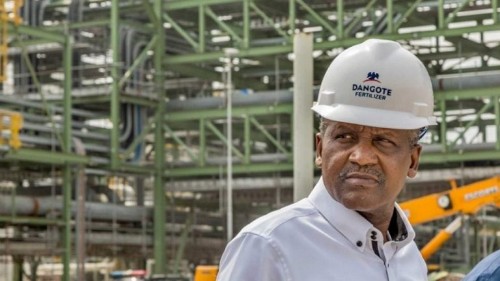The Federal Government’s committee, led by Minister of Finance Wale Edun, is set to discuss the pricing of petrol from the upcoming Dangote Petroleum Refinery.
The committee will hold meetings to determine a benchmark for the refinery’s crude oil payments in naira and decide whether to subsidize petrol prices or allow market-driven pricing.
According to officials, the cost of Dangote petrol is expected to be higher than current pump prices, which may pose challenges for dealers if the government doesn’t intervene.
The committee aims to establish a framework for crude oil sales to local refineries in naira, ensuring a smooth transition to the new refinery’s output.
Petrol sells at between N600 and N700/litre depending on the area of purchase across the country. The landing cost of the commodity, according to data released by the Major Energies Marketers Association of Nigeria recently showed that the cost of PMS was N1,117/litre.
Marketers say this is the actual market price of the commodity and explain that the cost of the product from the Dangote refinery should be around this figure.
The Nigerian National Petroleum Company Limited is the sole importer of petrol into the country. Other marketers stopped importing the commodity due to their inability to access the United States dollar required for petrol imports.
But last week at the presentation of the audited report and accounts of NNPC for the 2023 business year in Abuja, the firm’s Chief Financial Officer, Umar Ajiya, admitted that the oil firm was shouldering a heavy subsidy burden on petrol imports.
He said NNPC had been making PMS available for retail distribution at about half of the landing cost under an agreement with the government.
He explained that the company had been offsetting the shortfall in landing price and sale price through a reconciliation arrangement between the government and the company. He said the company had not paid any money to any marketer in the name of petrol subsidy in the last eight to nine years.
While the official pump price of petrol is about N600/litre, the average landing cost is about N1,200/litre. Ajiya said the company covered about N7.8tn in “shortfall” in the first seven months of this year.
“I think there is one fact that I need to make very clear, in the last eight or nine years, this company, even as a corporation as it were, has not paid anybody a dime or one naira as subsidy.
“No one has been paid a kobo by the NNPC in the name of subsidy. No marketer has received money from us by way of subsidy,” Ajiya said.
He said the government directs NNPCL to sell the petrol it imports, at a price that is half of the landing price. According to him, at times the Federal Government pays the money and it could as well net off for it.
“What has been happening is that we have been importing PMS, landing at a certain price, and the government is telling us to sell it at half price. So, that gap between that landed price and the half price is what we call shortfall or we call it a subsidy,” the CFO explained.
Earlier report had it that the Federal Government’s committee which was set up to ensure the implementation of crude oil sales to local refineries in naira has reached an agreement with the Dangote Petroleum Refinery for the rollout of petrol in September this year.
The Federal Government also disclosed that the sale of crude oil to Dangote Refinery and other local refineries will commence on October 1, 2024.
On Sunday, impeccable sources among oil marketers, the Federal Ministry of Petroleum Resources, and the Presidency confirmed to our correspondent that the cost of petrol from the $20bn plant would be discussed by the government and the management of the plant in the coming weeks.
They said the options before the government are to either pay subsidies on petrol without piling the burden on NNPC or to allow Nigerians to buy the product at the market price to be released by the Dangote refinery, which, of course, will be high.
“The only way the government can intervene is to subsidise. There is nothing NNPC can do. I mean this. Do you want to kill the NNPC? Do you want the company to continue carrying the subsidy burden after the explanation it gave last week? It is not sustainable.
“Except you are saying NNPC will start doing whatever it can and nobody will expect profit from the company,” a source at the FMPR, who spoke in confidence due to lack of authorisation to speak on whether the NNPC would intervene in PMS price from Dangote, stated.
Asked to state a possible solution to the matter, the official replied, “The solution is for Nigerians to pay the real cost of petrol. But then you know, other things will come into play, because, you know, our economy is not that good. Things are not good for everyone.
“However, it is for Nigerians to pay the real cost of petrol or for the government to bring back subsidies. I don’t know, but it’s just those two things. They may consider this at the meeting, but for now the major discussions centre on crude supply in naira, which should be finalised in a few weeks.”
The source said the sale of crude to Dangote in naira had been settled, stressing that “his (Dangote) own portion will be sent to him. But they are still working on the framework, I know, we’ve been having meetings. So we’re having meetings. So hopefully, I think by next week we should be able to get a clearer picture on the modalities. We meet almost every two or three times a week.”
The source noted that one major challenge is the lack of the United States dollar, but stressed that the committee “will benchmark the exchange rate for crude sale to Dangote.”
The official added, “All the framework will be sorted and you know AfreximBank is with us in this.”
Also commenting on the development when contacted and asked if marketers had reached a price for Dangote petrol ahead of its release next month, a senior official of the Major Energies Marketers Association of Nigeria explained that though members of the association were willing to load from the plant, it would be tough due to the price.
“There are two things: the first one is logistics and cost-taking. We’ve been taking AGO (diesel), ATK (aviation fuel) by vessel and truck. By now, we all know ourselves and we understand how it works. So that one is not a problem. When PMS starts, it will not be changed from what we were doing before. The methodology of picking it from them (Dangote) has already been worked out and it is already in place and play.
“Now, when it comes to price, that’s the second thing and the third one is, in what currency are we paying? That one is going to be between Dangote and the government because as the government has just confessed to you, there is a subsidy. So, Dangote cannot clear the subsidy by himself. In order to deal with it, I think the government is trying to intervene, though still in denial.
“However, I do not think the subsidy is a good policy. I do not think anything has changed concerning the subsidy. Subsidy shortchanges the country. The government still must recognise that things are very tough on Nigerians right now and must find a way. If it wants to remove the subsidy, what can it do to mitigate the challenges?”
The official, who also spoke in confidence, said the government had introduced the Compressed Natural Gas initiative to tackle the cost of subsidy on PMS.
“So, what he’s (President Bola Tinubu) trying to do is he’s trying to push CNG which is possible so that he can stop paying subsidies for PMS. The CNG uptake is going a lot slowly; but that is the solution, to move quickly with the alternative CNG, especially for commercial transportation and long-distance movement of foodstuffs from the bread baskets to the urban centres so that you can manage your inflation.
“But, can the government continue with a subsidy of N7.7tn? I don’t think so, and anybody who says that is not being fair to Nigerians. The government is just a temporary group of people in power; they will soon go when their time finishes but our country will still be here.
“It is government policy. Currently, the government policy is that there is no subsidy; there is no subsidy provided for in the budget. How much will Dangote sell for? Dangote is not prepared – I don’t think – to sell at below the cost of production. So, we will need to wait to see what the government will do,” the source stated.
Asked whether there would be an intervention from the government, the official replied, “There may be an intervention, yes. Refined crude will still be at the international market price, as it should be.”
On whether marketers are ready to buy petrol at the international market price form Dangote, the MEMAN official said, “No, marketers will not buy at higher than our pump prices and sell at our prices. But we don’t know how marketers will buy it.”
When probed further to tell if there is a pricing template for petrol now from Dangote, the official said, “No law allows you to have a pricing template; we have PIA (Petroleum Industry Act). The prices of diesel and aviation fuel are the market price. There is no official market price for PMS as we speak, no.”
On his part, the National Operations Controller of the Independent Petroleum Marketers Association of Nigeria, Mustapha Zarma, said unless there is an intervention by the government in the price of Dangote petrol, marketers will not be able to buy it if the policy on capping is not lifted.
“Nobody can start discussing petrol pricing modalities with Dangote now because you cannot buy their product. At the prevailing retail price in Nigeria now, you cannot buy their PMS. So they can only go into agreement with the government on pricing. Otherwise, the policy on capping of petrol prices will have to change.
“There is a cap on the price of petrol in Nigeria now, and I don’t think that as a businessman who is into business to make a profit, Dangote will want to sell his product below the market price. We all know NNPC has been shouldering subsidies on petrol.”
A post on the official X (formerly Twitter) page of the finance ministry about two weeks ago, stated that the meeting of the committee on crude sale in naira was to review progress on key initiatives.
At the meeting, key roles were outlined for stakeholders, including the Nigerian Midstream and Downstream Petroleum Regulatory Authority, Central Bank of Nigeria, Nigerian Upstream Petroleum Regulatory Commission, and the African Export-Import Bank to ensure smooth implementation.
The post read, “The Minister of Finance and Coordinating Minister of the Economy, Mr. Wale Edun, today led the Implementation Committee meeting on the transition to crude oil sales in naira.
“The meeting reviewed progress on key initiatives, including the upcoming commencement of naira payments for crude oil sales to the Dangote Refinery starting October 1, 2024.”
Also, the Executive Chairman of the Federal Inland Revenue Service, Dr Zacch Adedeji, and the Chairman of the Technical Sub-Committee reported that “The first PMS delivery from Dangote is expected next month under existing agreements.”
Earlier report had it that the finance minister inaugurated a technical sub-committee tasked with developing the framework for the sale of crude oil to local refineries in naira.
This initiative aligns with the recent presidential directive aimed at enhancing Nigeria’s refining capacity and promoting economic growth.
Crude oil supply to domestic refineries has been an issue for months, particularly since the multi-billion dollar Dangote Petroleum Refinery came on board.
Domestic crude oil refiners, including the $21bn Dangote refinery, have repeatedly complained about the poor supply of crude to their plants.
Credit: The Punch
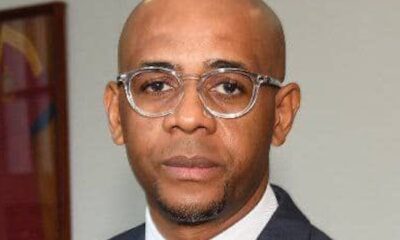
 BIG STORY3 days ago
BIG STORY3 days ago
 BIG STORY5 days ago
BIG STORY5 days ago
 BIG STORY3 days ago
BIG STORY3 days ago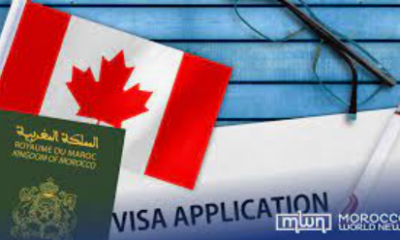
 BIG STORY3 days ago
BIG STORY3 days ago
 BIG STORY2 days ago
BIG STORY2 days ago
 BIG STORY4 days ago
BIG STORY4 days ago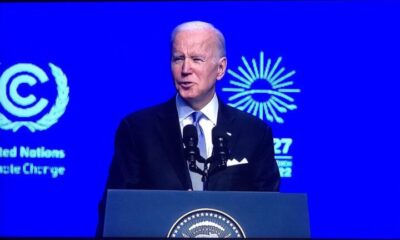
 BIG STORY5 days ago
BIG STORY5 days ago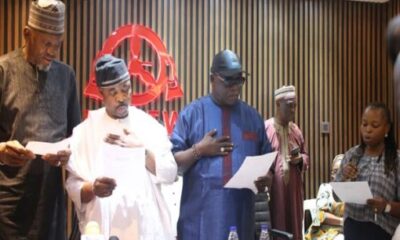
 BIG STORY1 day ago
BIG STORY1 day ago




